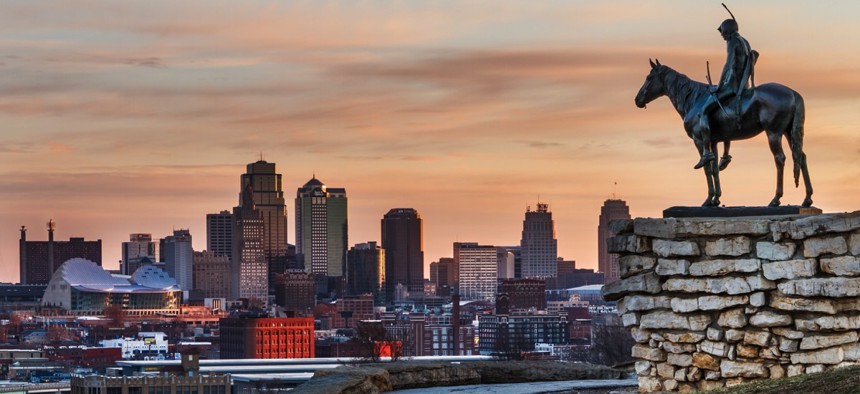Kansas City’s Free Transit Plan for Election Day; Jackson, Miss.’s Pothole Payouts

Kansas City, Missouri
Also in our State and Local Daily News Digest: Feds vs. polygamous towns in Ariz. and Utah; Standing Rock Sioux tribe’s appeal in N.D.; and N.Y.C.’s Second Ave. Subway nearly ready.
Here are some state and local news stories that caught our eye ...
ELECTIONS | Kansas City is joining other metro areas around the country in using public transportation systems to provide free rides to voters on Election Day. “Exercising the right to vote is so important that we want to make it as easy as possible to get to the polls,” said Kansas City Area Transportation Authority President Robbie Makinen. [The Kansas City Star]
POTHOLES | The city of Jackson, Mississippi is spending thousands of taxpayer dollars each year on payments to people who have damaged their vehicles driving over potholes. The payouts totalled about $170,000 between 2012 and October 2016. [The Clarion-Ledger]
FIREFIGHTING | The state of Nevada could face significant financial liability if investigators confirm a fire that destroyed 23 homes was sparked by a controlled burn. The Little Valley Fire started on Oct. 14 and burned in an area about 8 miles northwest of Carson City. “It’s not unreasonable to think, because it’s not just the houses but all of the other costs, that we’ll hit $80 million,” said an independent fire investigation consultant. “This is a big hit.” [Reno Gazette-Journal]
CIVIL RIGHTS | The federal government’s case to disband the shared police department of two polygamous towns in Arizona and Utah—on the grounds of discrimination against religious non-believers—began Monday in Phoenix. [WESH 2]
BRIDGEGATE | Bridget Anne Kelly, Gov. Chris Christie’s former deputy chief of staff, testified in court Monday she’d told him in 2013 that Fort Lee, New Jersey’s Mayor Mark Sokolich suspected closed lanes leading to the George Washington Bridge were “government retribution,” only to be ignored. [The Philadelphia Inquirer]
TRIBAL RELATIONS | The continuance of the Dakota Access Pipeline project could indefinitely strain relations between North Dakota and the Standing Rock Sioux Tribe, whose Chairman Dave Archambault II called on President Obama to intervene saying: “Our lives are at risk, and the places we hold sacred are at risk. Millions have stood with us in opposition to this pipeline, and he must heed their call.” [The Bismarck Tribune]
ENERGY | Portland General Electric is planning a test before year’s end to help determine whether Oregon’s only coal-fired power plant might one day become the nation’s largest producer of biomass-generated electricity, using pulverized, roasted wood. Located in Boardman, Oregon, the facility is currently scheduled to close in 2020. [The Oregonian / OregonLive]
INSPECTION | A luxury, 58-story residential tower in San Francisco is sinking into soft soil and tilting. And leaked documents show the city’s Department of Building Inspection and the building’s developer knew it was sinking more than anticipated back in 2009 but didn’t disclose the information publicly. [AP / SFGate]
MUNICIPAL FINANCE | Meet the man Michigan’s Treasury hired to help cities escape lingering effects of the last recession through data-driven pension and service reform: Eric Scorsone, the state’s new senior deputy treasurer for finance. [Lansing State Journal]
TRANSPORTATION | New Yorkers who thought they might not live to see the opening of the Second Avenue subway line—a project that has been more than 100 years in the making—may not have to wait that much longer. Thomas F. Prendergast, the MTA’s chairman, said “we’re now within striking distance of having it done.” [The New York Times]
NEXT STORY: Newark unveils smart city lab, kiosk





